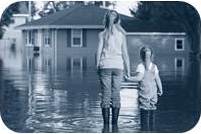Floods can happen any time and any place, and they can happen fast! Whether you live near the water or not, you should always be ready. Here are some important things you can do to prepare.
4 April 2012

Everyone Lives in a Flood Zone
Did you know that most homeowners policies do not cover flood damage? However, you can purchase flood insurance as a separate policy from your insurance agent.But do you need flood insurance? In a word, "YES!"
Floods can happen anywhere, anytime. Even an inch of water in your home can cause extensive--and expensive--damage. Consider the following....
- Floods are the most common and costly natural disaster, according to the Federal Emergency Management Agency (FEMA).
- In the past several years, about 60 percent of all declared disasters involved flooding.
- Floods are caused by storms, hurricanes, water backup due to inadequate or overloaded drainage systems, as well as broken water mains. In Florida especially, slow-moving tropical storms can result in significant inland flooding.
- You do not need to live near water to be flooded. Some of the most damaging and costly floods occur hundreds of miles from coasts and river banks.
- Nearly one-third of flood insurance claims come from low-to-moderate risk areas. In areas with the greatest risk of flooding, Special Flood Hazard Areas (SFHAs), a building has a 26 percent chance of being flooded during a 30-year mortgage. Sources: FEMA and the National Flood Insurance Program (NFIP)
What Does a Flood Insurance Policy Cover?
A standard flood policy covers the home's structure (building) for up to $250,000 and its contents up to $100,000. In addition to the building, the structure portion of the policy will typically cover furnace, water heater and air conditioner damage; flood debris clean up; and flood surface damage such as to installed carpeting and tile. The contents portion will typically cover furniture, clothing, electronics, and valuables such as jewelry and art.If you need an additional amount of coverage based on the value of your home and contents, excess flood policies are available. Check with your insurance agent to learn more about flood policy options and which type of coverage best meets your individual needs. For renters, flood insurance is available for contents coverage up to $100,000. Flood insurance is also available for business owners (nonresidential property owners); standard coverage includes up to $500,000 each for a building and its contents.
If You Wait, It May Be Too Late
Flood insurance is typically subject to a 30-day waiting period, meaning that it will not cover losses incurred within 30 days after the policy effective date. So don't wait until a hurricane is forecast in your area to purchase a flood policy--or it will be too late to have coverage for that storm. If a policy is purchased in connection with a mortgage, the 30-day waiting period does not apply.Be Prepared Before a Flood
Floods can happen any time and any place, and they can happen fast! Whether you live near the water or not, you should always be ready. Here are some important things you can do to prepare.- Copy your most important documents (i.e., mortgage papers, deed, passport, insurance policies, bank information). Keep copies in your home above ground level, and store originals in a secure place outside the home, such as a safe deposit box.
- Complete a household inventory ahead of time. The more comprehensive you make the list, the better.
- Take photos of your most valuable possessions (i.e., furniture, musical instruments, electronic equipment) and keep the photos with copies of your important documents. With the photos be sure to include receipts, so that you have proof of the original cost, purchase date, manufacturer, model number, and other details that will help expedite repairs or replacement.
- Have an emergency plan in place for your family. Keep at least a 3-day supply of nonperishable food and bottled water on hand, plus an emergency kit that includes a battery-powered radio.
- Be sure to review your policy coverages with your insurance agent annually, to be sure you have adequate coverage. Between policy reviews contact your agent to discuss any important changes, such as remodeling or new valuables, to confirm you have the coverage you need.
Be Safe During a Flood
Hopefully, you will never have to experience a flood firsthand. But if you do, there are a few things you can do to help stay safe:- Closely monitor weather advisories, and evacuate if ordered to do so.
- Keep away from downed power lines and any other electrical wires. Electrocution is often a major cause of death in floods.
- Do not walk through a flooded area.
- Just six inches of moving water can knock you down.
- Do not drive through a flooded area. Just two feet of water can lift and move a car, even an SUV. More people drown in their cars than anywhere else during a flood.
Check Out these Helpful Website
- FloodSmart.gov, the official site of the National Flood Insurance Program (NFIP), includes helpful information about the causes of flooding and flood risk scenarios. The website also includes an interactive tool that shows the potential damage and cost a flood could cause to your home. Tips on preparing before a flood and recovering after one are also provided.
- FloridaDisaster.org provides tips on developing an emergency plan for your family. There is even a section for the youngest family members to get involved, "Kids Get a Plan."
- NOAA.gov, the National Oceanic and Atmospheric Administration's website, also includes tips on flood safety and awareness.
No comments:
Post a Comment